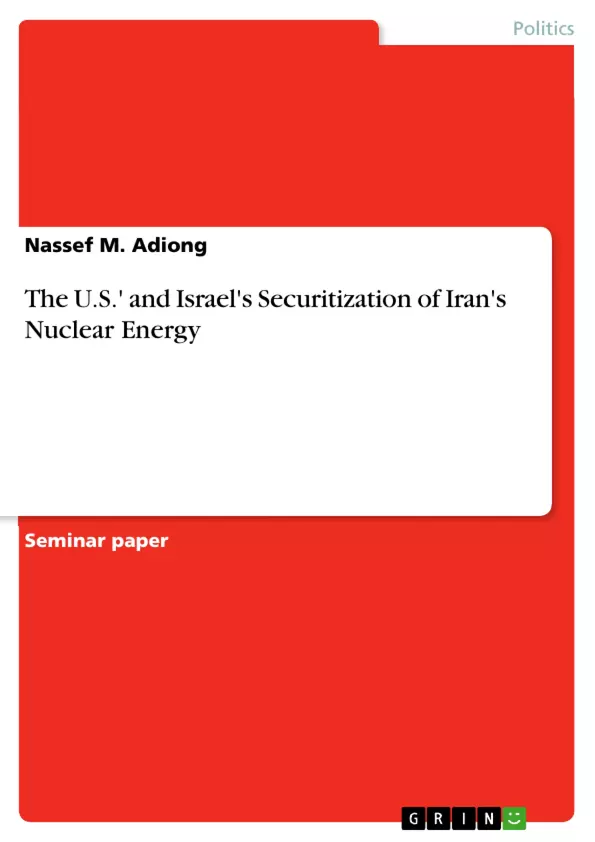Caveat: The title above is quite absurd due to the fact that in the traditional sense of defining security, any country aspiring for weapons of mass destruction or WMDs, which obviously nuclear used for developing weapons, is part and parcel of that nexus and is apparently a security issue; in other words it doesn’t need the securitization process. It absolutely manifests the core concepts of traditional security which is akin to military, war, or what we should say high politics of hard power prior to the Cold War period.
However, my conception of the above statement is merely a Western thought, though majority in the academia that specializes in international security accept that premise. One would ask if we can actually securitize a security issue. The answer is definitely no, because in the first place, it has been securitized and an extraordinary response was made to normalize the matter.
The nuclear energy issue of Iran is a different case because it was foreseen as an unprecedented security matter by Israel and the United States in which Iran hasn’t developed a culpable force of nuclear enrichment particularly uranium that would be used for military defence or political weapons as how the West reiterated this contention. The thin difference in securitizing Iran’s nuclear energy ambition is looking at a causational link that made Iran decided to produce its own nuclear energy enrichment, which scholars have been debating on the intent and purpose of Iran.
[...]
Inhaltsverzeichnis (Table of Contents)
- The U.S.' and Israel's Securitization of Iran's Nuclear Energy
- The Origin of Iran's Nuclear Energy and its Motivations
- Iran's Nuclear Energy: An existential threat to the U.S.' and Israel's security?
Zielsetzung und Themenschwerpunkte (Objectives and Key Themes)
This work analyzes the securitization of Iran's nuclear energy program by the United States and Israel. It aims to understand Iran's motivations for pursuing nuclear energy development, while examining how this ambition has been framed as an existential threat by its adversaries. The analysis departs from traditional security frameworks, focusing on the Iranian perspective and the role of media narratives.
- Iran's motivations for developing nuclear energy.
- The securitization of Iran's nuclear program by the U.S. and Israel.
- The role of Western media in shaping perceptions of Iran's nuclear ambitions.
- The historical context of Iran's nuclear capabilities.
- Comparison of Iranian and Western perspectives on nuclear energy.
Zusammenfassung der Kapitel (Chapter Summaries)
The U.S.' and Israel's Securitization of Iran's Nuclear Energy: This introductory chapter challenges the automatic securitization of Iran's nuclear program, arguing that the context is different from typical WMD scenarios. It outlines the conflicting perspectives of Iran and the West regarding the intentions behind Iran's nuclear energy development—energy needs versus regional instability. The chapter lays out the methodology, focusing on the Copenhagen School's securitization framework and aiming for a balanced understanding that includes the Iranian perspective.
The Origin of Iran's Nuclear Energy and its Motivations: This chapter explores the historical context of Iran's nuclear program, arguing that its development is driven by genuine energy needs exacerbated by sanctions and a desire for regional influence. It discusses Iran’s economic reliance on oil, the need for energy diversification, and political motivations such as achieving a greater role in the international community and Islamic world. The chapter also touches upon Iran’s pursuit of a diverse energy portfolio and its acquisition of nuclear technology, including collaborations with other countries.
Schlüsselwörter (Keywords)
Iran, nuclear energy, securitization, United States, Israel, energy security, regional stability, international relations, Copenhagen School, media influence, historical context, political motivations, economic needs.
Frequently Asked Questions
What is the "Securitization" of Iran's nuclear energy?
Securitization is a process where a political issue is framed as an existential threat by leaders (like the U.S. and Israel), justifying extraordinary measures that go beyond normal political procedures.
Why does Iran claim it needs nuclear energy?
Iran argues that it needs nuclear energy to diversify its energy portfolio, reduce economic reliance on oil exports, and meet the growing domestic demand for electricity.
What is the Copenhagen School's role in this analysis?
The Copenhagen School provides the theoretical framework for securitization, focusing on how security threats are constructed through speech acts and media narratives.
How does the Western media influence the perception of Iran?
The study examines how media narratives often align with political securitization efforts, framing Iran's technological ambitions primarily as a military threat rather than a civil energy project.
What are the political motivations behind Iran's nuclear program?
Beyond energy, motivations include achieving greater regional influence, national prestige, and a stronger position within the international community and the Islamic world.
- Quote paper
- Nassef M. Adiong (Author), 2009, The U.S.' and Israel's Securitization of Iran's Nuclear Energy, Munich, GRIN Verlag, https://www.grin.com/document/122706



